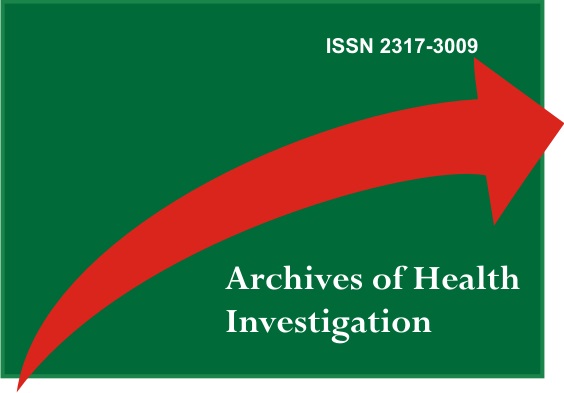EFFECTS OF THE USE OF THE PHYTOTHERAPIST PHOLIA NEGRA (ILEX PARAGUARIENSIS) IN ALLIANCE WITH MODELING MASSAGE N WOMEN WITH OBESITY
DOI:
https://doi.org/10.21270/archi.v12i4.6050Keywords:
Obesity, Herbal Medicines, Modeling MassageAbstract
Phytotherapy has relevance in therapeutic practice due to its low cost, effectiveness and fewer adverse effects. Many women seek treatments for obesity and, most of the time, opt for slimming drugs and thus end up self-medicating, dieting on their own, without consulting the appropriate professionals. The present study evaluated the effects of using the phytotherapic Pholia negra (Ilex paraguariensis) combined with modeling massage in women with obesity. It was a descriptive, exploratory, prospective research with a quantitative and qualitative approach, with non-probabilistic convenience sampling, whose population was composed of obese women, accounting for the participation of 10 individuals. The research was approved by the Research Ethics Committee of Faculdades Nova Esperança - FACENE/FAMENE, with opinion number 5,101,462. The study showed that 90% of women are married, 50% are aged between 25 and 35 years. After the proposed treatment, 2 participants were no longer overweight (BMI 22.1 kg/m² and BMI 22.7 kg/m²) and 4 women were no longer obese and are now overweight (BMI 26.8 kg/m², BMI 29.4 kg/m², BMI 28.3 kg/m² and BMI 26.4 kg/m²). There was a significant reduction in abdominal circumference in all women, with 4 of them (40%) having an abdominal circumference below 80 cm, which is recommended by the WHO. During the clinical evaluations, information on the risks of indiscriminate use of herbal medicines and self-medication was clarified, verifying the need for policies to guide safe use and to promote awareness of the risks inherent to medicines. Therefore, the importance of pharmaceutical care is emphasized, in order to guarantee quality and safety in relation to the use of herbal medicine, to obtain weight loss in a healthy way.
Downloads
References
Tarozo M, Pessa RP. Impacto das consequências psicossociais do estigma do peso no tratamento da obesidade: uma revisão integrativa da literatura. Psicologia: Ciência e Profissão. 2020; 40.
Brasil. Pesquisa do IBGE mostra aumento da obesidade entre adultos. Governo do Brasil, 2020.
Alonso-Castro AJ, Ruiz-Padilla AJ, Ramírez-Morales MA, Alcocer-García SG, Ruiz-Noa Y, Ibarra-Reynoso LDR, et al. Self-treatment with herbal products for weight-loss among overweight and obese subjects from central Mexico. Journal of Ethnopharmacology. 2019; 234, 21-26.
Palheta RA, Oliveira Freitas FMN. Revisão integrativa sobre plantas medicinais no tratamento de obesidade e dislipidemias em mulheres no climatério. Research, Society and Development. 2022; 11(15), e283111537153-e283111537153.
Oliveira IC, Cordeiro PBDMH. Os fitoterápicos como coadjuvantes no tratamento da obesidade. Cadernos Unifoa. 2013; 8(1 (Esp.)), 97-104.
Lucas RR, Pereira FF, Júnior ADFS, Cavalcanti BC, Júnior HVN, Silva GR, Magalhães, HIF. Fitoterápicos aplicados à obesidade. DEMETRA: Alimentação, Nutrição & Saúde. 2016; 11(2), 473-492.
Fagundes A, Schmitt V, Danguy LB, Mazur CE. Ilex Paraguariensis: composto bioativos e propriedades nutricionais na saúde. RBONE-Revista Brasileira de Obesidade, Nutrição e Emagrecimento. 2015; 9(53), 213-222.
França IC, Akatsuka EW, Leal CP, Figueiredo MR, et al. Eficácia das técnicas de massagens para redução de adiposidades e da fibro edema gelóide com enfase em massagem modeladora. Atas de Ciências da Saúde (ISSN 2448-3753). 2016; 4(2), 23-30.
WHO. World Health Organization. Obesity: preventing and managing the global epidemic. Geneva; 1997.
Bernardi MM, Souza Spinosa H, Ricci EL, Reis-Silva TM. Preclinical study of an antiobesity herbal medicine, PholiaNegra (XTract Vetorized)™, in male and female rats fed with high-fat diet: comparison with sibutramine. Journal of the Health Sciences Institute. 2012; 30(4), 406-410.
Pinheiro AK, Geron VLMG, Terra Júnior AT, Nunes JS, Brondani FMM. Constipação intestinal: tratamento com fitoterápicos. Rev Cient FAEMA: Revista da Faculdade de Educação e Meio Ambiente – FAEMA. 2018; Ariquemes, v. 9, n. ed esp, p. 559-564.
Euzebio P, AM S. Atenção farmacêutica aplicada ao paciente idoso com constipação intestinal. 2013.[citado 21 de março de 2018].
Silva NG, Silva J. Aspectos psicossociais relacionados à imagem corporal de pessoas com excesso de peso. Revista Subjetividades. 2019; 19(1), em-02.
Schaurich KL, Brum CN, Zuge SS. A obesidade e a sua relação com a qualidade de vida, depressão, autoestima, autoimagem e autorealização. Anuário Pesquisa e Extensão Unoesc São Miguel do Oeste. 2017; 2, e15797-e15797.
Razmus M. Body appreciation and body‐related pride in normal‐weight and overweight/obese individuals: Does romantic relationship matter?. Perspectives In Psychiatric Care. 2019; 55(3), 464-470.
Muniz GR, Bastos FIPM. Prevalência de obesidade em militares da Força Aérea Brasileira e suas implicações na medicina aeroespacial. 2010.
Barbosa MR, Oliveira Penaforte FR, Sousa Silva AF. Mindfulness, mindful eating e comer intuitivo na abordagem da obesidade e transtornos alimentares. SMAD, Revista Eletrônica Saúde Mental Álcool e Drogas (Edição em Português). 2020; 16(3), 118-135.
Organização Mundial da Saúde. Obesity: preventing and managing the global epidemic. Report of a who consultation on obesity. Geneva, Switzerland: WHO, 2019.
Back IR, Dias BC, Batista VC, Ruiz AGB, et al. Fatores de risco para doenças cardiovasculares em universitários: diferenças entre os sexos/Risk factors for cardiovascular diseases in university students: differences between the sexes. Ciência, Cuidado e Saúde. 2019; 18(1).
Leal JB, Leal JB, Lima Borges Y, Oliveira DNC, et al. Modificações na composição corporal de mulheres em risco cardiovascular pelo método pilates. RBONE-Revista Brasileira De Obesidade, Nutrição E Emagrecimento. 2018; 12(76), 1009-1014.
Oliveira MAMD, Mafra NM. Uso da fitoterapia no tratamento da obesidade. Brazilian Journal of Surgery and Clinical Research. 2019; v. 27, n.1, p. 22- 27.
Boaventura BCB, Di Pietro PF, Stefanuto A, Klein GA, et al, Association of mate tea (Ilex paraguariensis) intake and dietary intervention and effects on oxidative stress biomarkers of dyslipidemic subjects. Nutrition. 2012; 28(6), 657-664.
Kang YR, Lee HY, Kim JH, Moon DI, et al, Anti-obesity and anti-diabetic effects of Yerba Mate (Ilex paraguariensis) in C57BL/6J mice fed a high-fat diet. Laboratory animal research. 2012; 28(1), 23-29.
Dickel ML, Rates SMK, Ritter MR. Plants popularly used for loosing weight purposes in Porto Alegre, South Brazil. Journal of Ethnopharmacology. 2007; 109(1), 60-71.
Araújo FG. Tendência da prevalência de sobrepeso, obesidade, diabetes e hipertensão em mulheres brasileiras em idade reprodutiva: Vigitel 2008-2015. 2018.


